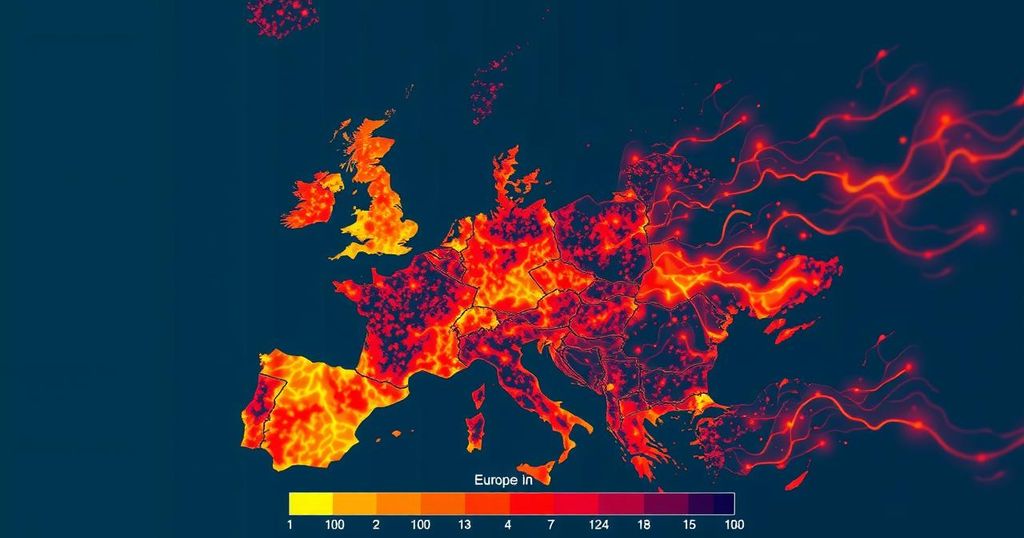A study from ISGlobal indicates that climate change caused over half of the 68,000 heat deaths in Europe in 2022. Approximately 38,000 lives could have been saved if not for pollution and environmental damage. The mortality impact was significant across demographics, particularly among women, the elderly, and southern Europeans. The research underscores the immediate health threats of climate change, suggesting urgent action is needed to mitigate these risks.
A recent study conducted by researchers at the Barcelona Institute for Global Health (ISGlobal) has revealed that climate change was responsible for over half of the 68,000 heat-related deaths in Europe during the intense summer of 2022. The analysis indicated that approximately 38,000 individuals would have been spared if pollution from human activities had not caused atmospheric warming. The mortality rates due to heat were found to be significantly higher than the number of murders recorded in Europe for the same year. Lead author Thessa Beck emphasized, “Many see climate change as a future concern. Yet our findings underscore that it is already a pressing issue.” The data highlighted that women, southern Europeans, and older demographics were disproportionately affected by the extreme heat. While previous knowledge indicated that carbon emissions intensified heatwaves, the specific contribution to mortality had not been quantified until now. The study concluded that 56% of heat-related fatalities could have been averted in an unaltered climate scenario driven by fossil fuel combustion and environmental degradation. This figure was consistent with a 44% to 54% range observed over the prior six years. Emily Theokritoff, a researcher at Imperial College London, noted, “Even small increases in temperatures can have devastating impacts on public health.” With Europe warming at twice the global rate, healthcare systems are increasingly ill-prepared for the public health consequences of rising temperatures. Doctors caution that the duration of intense heat compromises physical health, leading to greater mortality rates as the body struggles to adapt. Projections suggest that the anticipated loss of life in hotter summers will surpass any benefits from milder winters if global temperatures exceed 2°C above pre-industrial levels; the UN has warned that this rise could reach 3°C by century’s end. Although similar challenges exist in Africa, Asia, and South America, a lack of comprehensive data has curtailed research efforts in those regions. Beck stated, “A common misconception is that only extreme temperatures pose a serious risk.” The study’s findings reinforce that moderate heat can also adversely affect vulnerable populations. Utilizing health and heat data from 35 European nations, the researchers employed a model to simulate temperatures in a hypothetically unchanged world. Through this method, they identified a total of 22,501 heat-related deaths in women and 14,026 in men attributed to climate change. However, Garyfallos Konstantinoudis from Imperial College suggested that the authors might have overstated the heat’s impact on mortality, citing potential adaptations over time in response to extreme weather. To mitigate heat exposure risks, medical professionals advocate hydration, staying indoors during peak heat hours, and community support for the elderly. Additionally, governments can enact lifesaving measures by implementing heat action plans, enhancing green urban infrastructure, and reducing pollution. As Beck stated, “Heat can be very dangerous for the heart, especially for older people.”
The climate crisis has become an urgent public health issue, particularly as extreme weather patterns, including heatwaves, intensify. Research increasingly links rising global temperatures to significant health impacts, such as increased mortality rates during extreme heat events. The study by ISGlobal highlights the immediate consequences of climate change, specifically in Europe, demonstrating that the rapidly changing climate leads to severe health risks that disproportionately affect certain demographics, including older adults, women, and those living in warmer regions. Understanding these dynamics is essential for developing effective public health strategies and mitigation policies.
The findings of the ISGlobal study illuminate the stark reality of climate change’s immediate impacts on public health, revealing that a substantial portion of heat-related deaths could be prevented if not for human-induced factors. This underscores an urgent need for action to address climate-induced health challenges, particularly as Europe faces increasing temperatures. It calls for heightened awareness and proactive measures to protect vulnerable populations and mitigate the health risks associated with the ongoing climate crisis. The research findings may serve as a catalyst for policymakers and health officials to prioritize comprehensive strategies to combat heat-related health issues.
Original Source: www.theguardian.com






